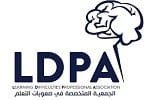
The Advisory Board aims at having a consultative role regarding policies for national government organizations and a mentor scheme enabling guidance regarding curriculum development and careers and raises the awareness of academics and administrative people.
The Learning Difficulties Advisory Board was declared by the LDPA President- Dr. Huda N Shaaban at the First Arab and Eastern Mediterranean Infant Mental Health Conference, held in Kuwait City, and was organized by The International Association of Child and Adolescent Psychiatry and Allied Professionals (IACAPAP), the Eastern Mediterranean Association of Child and Adolescent Psychiatry and Allied Professionals (EMACAPAP) and the Kuwait Association for Child and Adolescent Mental Health ( KACAMH), between 12-15, 2014.
- Intensively explore the educational practices provided to students with LD/ADHD and laws followed in the Arab world.
- Monitor problems and negative practices and constraints in LD/ADHD education to determine their causes and to propose appropriate solutions.
- Evaluate the existing special educational programs tailored for Learning Difficulties and Attention Deficit Disorder / Hyperactivity and develops new ones.
- Evaluate the preparation of special education teachers ’programs and offer suggestions to improve these programs.
- Include specialists’ perspective in public policies concerned with educating and teaching students with Learning Difficulties and Attention Deficit Disorder / Hyperactivity
- Develop a research based approach to curriculum modification and accommodations to suit the target groups
- Issue reports containing summary information on the nature of the laws adopted in all the Arab countries and societies concerning LD/ADHD, including general statistics
- Issuing statements and submit proposals for the development of legislation
- Compile various researches concerned the target category, as well coordinate between different research projects.
- Prepare reports and research.
- Communicate with the publicinterest associations working with these groups to unite efforts
- Communicate with regional and global educational institutions working on staff development and curriculum development.
- Activate the mechanisms for dialogue and increase the chances of communication between teachers and school administrations
- Increase the chances of communication between the school administrations and educational leadership.
- Increase the chances of communication between the Advisory Council members and the educational leaders and the legislative and executive authorities
- Act as resource persons, keynote speakers, lecturers and discussants at conferences, workshops and seminars
- Provide specialized consultations
- Organize meetings and professional educational events
- Provide opportunities for a greater role for teachers in the educational process development
- Enhance the professional growth of teachers

